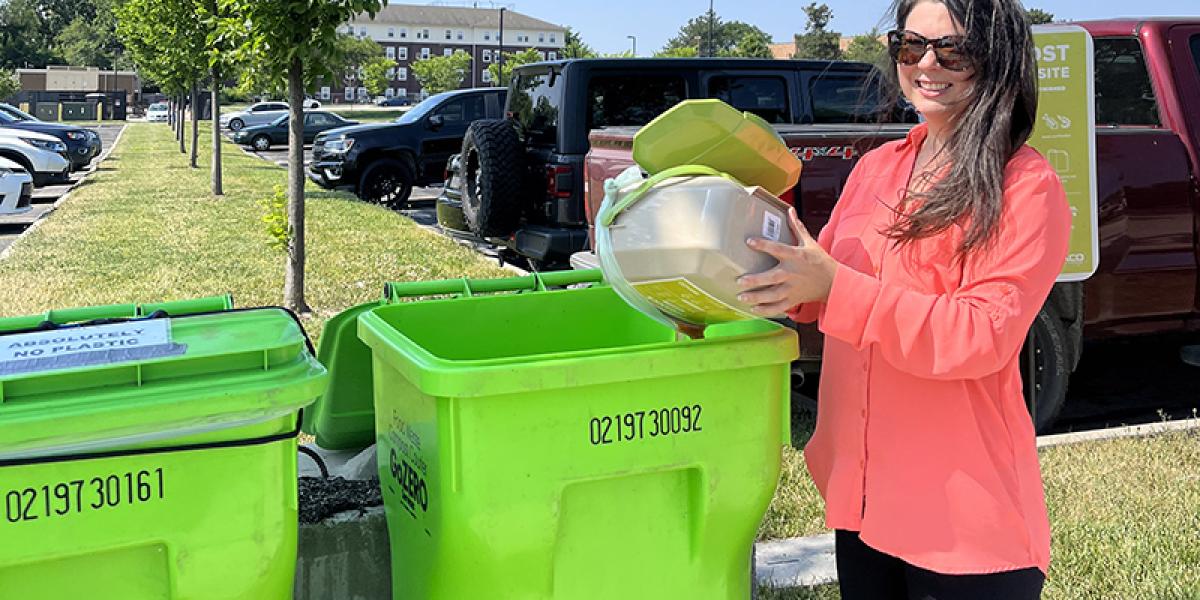You might want to think twice before throwing away your food waste after your meal. Facilities Operations and Development (FOD) is urging you to participate in its Compost Drop-Off Program.
Molly Kathleen, FOD’s zero waste coordinator, says they have passed out 100 compost bins so far at five locations across the Columbus Campus.
“The feedback we’ve received has been positive,” said Kathleen, “People are excited to start composting and participate in the program.”
As part of the university’s Sustainability Goals, FOD aims to foster a campus-to-community culture of sustainability-oriented practices that can be transferred into local and global communities.
This year, Ohio State received a Community Waste Reduction Grant from the Solid Waste Authority of Central Ohio (SWACO) to start the program. Projects selected identify unique waste reduction, diversion, and recycling needs of central Ohio, emphasize partnership building and collaboration, and address opportunities to leverage the waste stream for community benefit.
The university was one of nine local organizations that was awarded more than $94,289.85 in grant funding. SWACO allocated $9,571 to Ohio State and OSU was tasked with providing a 25% grant match. Kathleen says the project budget is mainly going toward buying compost bins, but they also used some funding to produce bin labels and site signage.
When an intern was distributing bins on campus, Sonia Lisko, a clinical applications consultant, was in the lobby of 660 Ackerman Road. She loved the idea of having a place to drop-off waste. Lisko had been wanting to take part in home composting for a while, but hadn’t gotten around to it.
When she found out there was a drop off bin on the way from her car to her building entrance, she had to try it out.
“I was so surprised how much the bin holds and it feels great not to throw things like banana peels and paper towels in a landfill,” Lisko said. “I’ve already purchased 75 more compostable bags like the ones they give you to get started, so I am definitely hooked!”
FOD’s composting team also has five events scheduled through July for people who want to pick up a Welcome Kit, which contains a home compost bin, sample compostable liners and an informational flyer.
The goal, based on giving out 500 kits, is to collect 3,600 pounds of food each week, which equates to 7 tons of food over the 43-week period.
“It’s bridging the gap between the sustainability culture that we’re building at Ohio State and this is an opportunity to take these free practices home to share with your family,” Kathleen said.
Ohio State implemented a goal to achieve zero waste by 2025 by diverting 90% of waste away from landfills. Organic materials represent about 1/3 of what people throw away.
Kathleen says you should consider composting to combat climate change, enhance soil and protect water, and build community and food system resilience.
When the program wraps up, the organics from the drop-off sites will be picked up and put into a roll-off, which is a 40-yard dumpster.
The team will send the wastebin to the Ohio Department of Rehabilitation and Corrections in London, where the materials will be processed. The facility is a registered Class II compost facility, which means it’s authorized to accept food waste.
Kathleen hopes to keep staff engaged during the process by sending out information on progress. The updates will include weight-based information which will tell them how their participation is impacting the environment as well as tips and tricks for composting at home.
If you are considering getting involved, here is a list of what can be composted and what cannot be composted:
Accepted:
- Use BPI certified bag or no bag at all
- Food scraps
- Bones and shellfish
- Meat
- Dairy
- BPI-certified compostable serving ware
- Soiled paper napkins and paper towels
Not Accepted:
- No plastic bags. Use compostable bags
- No pet waste
- No diapers
- No plastic-coated paper
Click here to sign up for FOD’s Compost Drop-Off program.

